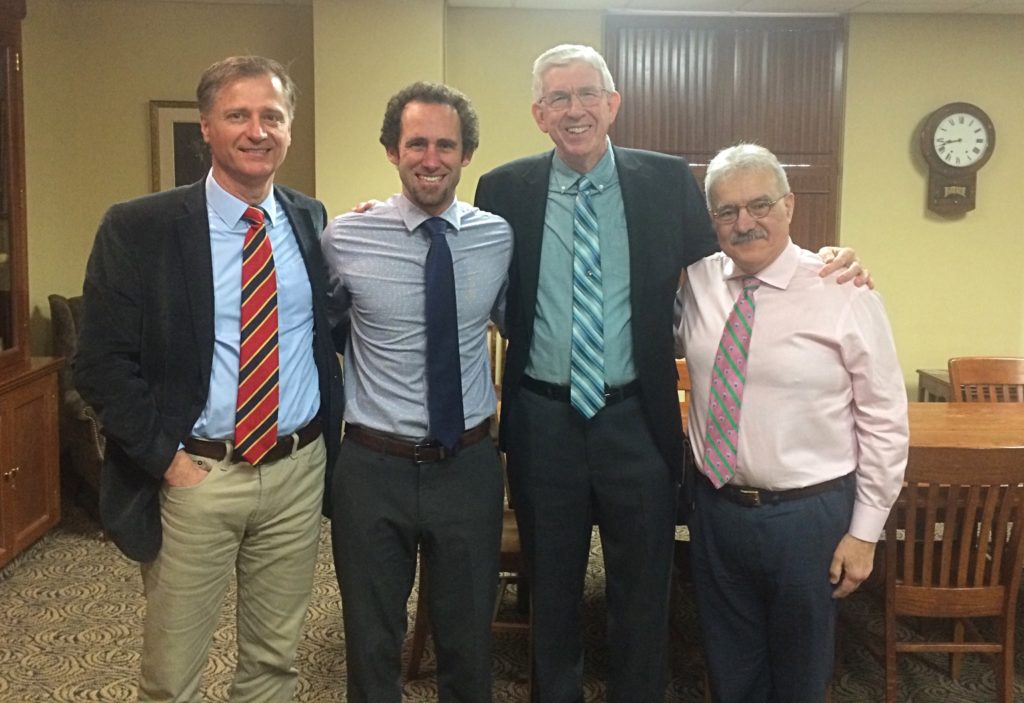
March 16, 2018 was a most momentous day. I turned thirty-four years old. I also received the best birthday present I could’ve hoped for—a “passed” dissertation. My thirty or so years of non-stop education has (finally) reached its conclusion. People tell me I’m supposed to be an expert, seeing that I’ve completed four degrees. I’m learning, however, that the title of “novice” is much more appropriate than “Doctor.”
Reading, Researching, and Writing
I began my Ph.D. studies at The Institution in January of 2015. From the start, my research interest was Robert Murray M’Cheyne. I initially planned to study “The M’Cheyne School” of ministers in the Free Church of Scotland. But the more I read and researched the more I realized how a thorough study of M’Cheyne’s piety was needed. His brief life has left a long legacy. His story continues to influence countless people over two hundred years after his birth. His pithy quotes on doctrine and spirituality saturate books on all manner of subjects from all kinds of Protestant traditions.
In the spring of 2016, I recognized how the prevailing narrative around M’Cheyne’s life is somewhat miscast. He’s commonly portrayed as a model of personal holiness. Said another way, his devotion to the means of grace is what most captivates Christians. Therefore, the existing studies on M’Cheyne focus on how he pursued the means of grace. I believed a more foundational question needed asking and answering: “Why did M’Cheyne pursue holiness with such singular passion?”
So, I got to work.
The fruit of my research is a dissertation titled “A Communion of Love: The Animating Principle Behind the Christocentric Spirituality of Robert Murray M’Cheyne.” The title encapsulates my thesis, which states, “The primary objective of this dissertation is to demonstrate the crucial place that love for Christ occupies in M’Cheyne’s spirituality.” Over the course of ten chapters, I argue that M’Cheyne’s theology centered on knowing God’s love in Christ and that his piety was little more than the return of love to Christ. His holiness shined brightly because he loved Christ so deeply.
Nervous and Anxious
I began writing the dissertation in July of 2017. I submitted it to my examining committee seven months later on Valentine’s Day. The readers were all men whom I’ve looked up to for many years: Drs. Stephen Yuille, Tom Nettles, Michael Haykin, and Sinclair Ferguson. Each man has proved himself an eminent scholar throughout the process and, even more importantly, a model of godliness.
When I left for Louisville on March 15th to defend the dissertation, I went with a feeling I’ve rarely experienced—nervousness. Outside of being in situations with heights (we are not close friends), I don’t know if I’ve ever been nervous about something. But I was a bundle of nerves as I entered the Haldeman Room at 8:00 a.m. on the 16th. Gratefully, the committee was quite encouraging, and the defense went better than I’d anticipated. It was one of the happiest days of my life (which my family says you can see in my smile below).

Mastered By, Not Mastering
Someone told me last week, “You’re the M’Cheyne expert now!” I’m not even close. My studies have only proved how far I have to go to be even a small reflection of M’Cheyne’s faithfulness.
I believe M’Cheyne is an unusually compelling example for pastors. I long to see a revival of his ministerial model, one built on an adoration of Christ that promotes humble piety and zealous soul-winning. In the coming years, I hope to publish a few different works on M’Cheyne, all aimed at retrieving his simple, yet powerful pattern for gospel ministers.

Please note: I reserve the right to delete comments that are offensive or off-topic.